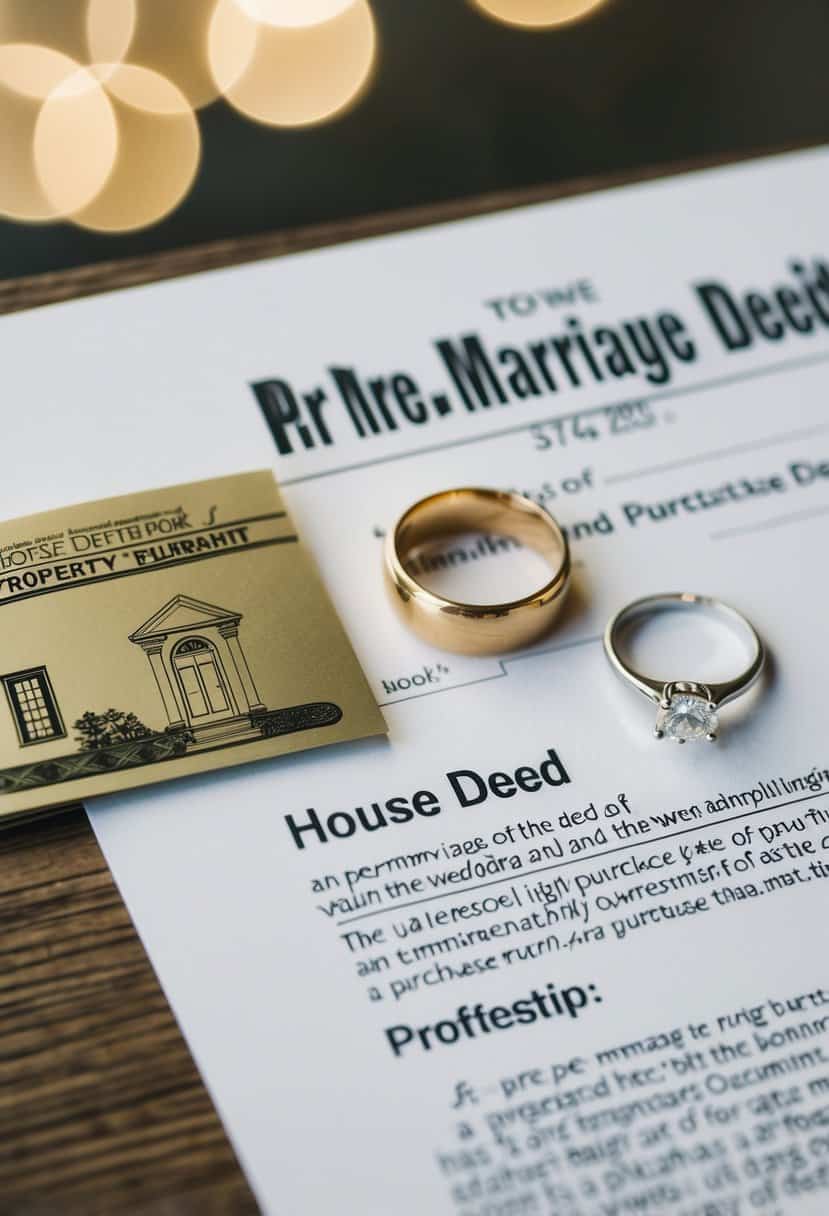Can My Wife Take My House if I Bought It Before Marriage in the UK? Understanding Your Rights
When you marry, it’s natural to wonder how your assets, like a house you bought before tying the knot, might be affected. In the UK, property owned before marriage is typically considered non-matrimonial property. This means it often remains yours alone. However, it’s not always that simple, and changes can occur depending on family law dynamics concerning pre-marital assets.

If your house becomes the marital home during your marriage, its status can shift, possibly leading to a division during divorce proceedings. This can get even more complex if both you and your spouse contributed to the mortgage, renovation, or maintenance.
Seeking legal advice is a good step in managing these uncertainties. Getting guidance from family law experts can help you navigate the specifics of your situation. This way, you’ll know exactly where you stand and what to expect, ensuring you maintain clarity over your pre-marital assets.
Understanding Property and Asset Types

In the UK, what happens to your property in a divorce depends largely on how assets are categorized. The distinction between matrimonial and non-matrimonial properties can determine your financial future.
Differentiating Non-Matrimonial and Matrimonial Assets
Assets you owned before marriage are typically seen as non-matrimonial assets. These include property or investments you had prior to tying the knot. In contrast, matrimonial assets are those accumulated during the marriage, such as shared bank accounts or jointly bought homes.
Even if you purchased a house before marriage, its classification can change. If your spouse contributed financially or the property’s value increased significantly during your marriage, it might be seen as a shared asset. This means it could be subject to division.
The Role of Matrimonial and Non-Matrimonial Properties in Divorce Settlements
During divorce settlements, the court assesses both types of properties. Matrimonial and non-matrimonial assets are both considered, but their treatment can vary.
Non-matrimonial property, like a house owned before marriage, might remain solely yours. However, fairness is key in UK law, which can mean reassessing asset categories to ensure an equitable split. If the property became a family home or significant funds were invested by both parties, it might be treated differently. Understanding these distinctions helps you protect your rights in a divorce.
Legal Framework Governing Pre-Marriage Property

Understanding how the law treats property you owned before marriage in the UK is essential. The division of assets in divorce can impact legal rights, especially regarding matrimonial homes and title deeds.
Matrimonial Causes Act 1973 and Property Rights
Under the Matrimonial Causes Act 1973, property acquired before marriage is generally considered separate. However, during a divorce, the court can decide to redistribute assets, including property you owned before the marriage. This act considers contributions made by both partners, even if the home was in one person’s name initially.
If your partner contributed financially or through maintenance, they could claim a share. The court might evaluate various factors to ensure a fair outcome. It’s crucial to understand how these provisions might affect your property rights in a UK divorce.
Matrimonial Homes Rights and Title Deeds Consideration
In the UK, the concept of matrimonial homes rights allows the non-owning spouse to live in the family home until the marriage ends. This is ensured through a matrimonial homes rights notice on the title deeds. The Land Registry maintains these records, which can protect your partner’s interests.
If a matrimonial homes rights notice is in place, it prevents selling or transferring the property without agreement. It’s important to be aware of these rights and how they interact with your property holdings, ensuring you navigate these legal waters effectively.
Agreements and Orders that Impact Property Division

When splitting assets like a house you bought before marriage, agreements and orders can make a big difference. Prenuptial and postnuptial agreements set expectations before and during the marriage. Consent orders establish guidelines after the breakup. Knowing how these work can save time and stress.
Understanding Prenuptial and Postnuptial Agreements
A prenuptial agreement (prenup) outlines how assets will be divided if the marriage ends. It can specify what happens to a house you owned before marriage. Prenups must be fair and meet legal standards to be valid in the UK.
If you didn’t set up a prenup before getting married, a postnuptial agreement (postnup) can be created later. It’s similar to a prenup but is made after the wedding. Both agreements can help protect your property by clearly defining who gets what.
These agreements are not automatically enforceable, but courts often take them into account when making decisions. They need to be fair and made without pressure. Legal advice is important to ensure that these agreements serve their purpose and are recognized in court.
The Importance of Consent Orders in Property Settlement
A consent order is a legal document approved by a court. It finalizes what both parties agreed to in a divorce settlement, including how to divide assets like property. If you and your spouse agree on dividing your house, a consent order ensures that this plan is legally binding.
To obtain a consent order, you must submit an application alongside a draft order to the court. Once approved, it prevents future disputes over property claims. This is especially important when you want to ensure your house remains separate property.
Getting a consent order requires careful documentation, but it provides peace of mind by making the agreement official. Seeking legal advice can help you draft an order that meets all legal criteria.
Processes and Professionals Involved in Divorce Settlements

In divorce settlements, achieving a fair outcome often involves a mix of professionals and processes. You will learn about mediation and arbitration for collaborative solutions and how to choose the right family law solicitor or divorce lawyer for legal guidance.
The Role of Mediation and Arbitration
When going through a divorce, you might consider using mediation or arbitration to reach a settlement. Mediation involves a neutral mediator who helps both parties communicate and agree on settlements without going to court. Mediation can save time and reduce the stress that comes with lengthy legal battles.
Arbitration, on the other hand, is more formal. An arbitrator listens to both sides and makes legally binding decisions. It’s similar to a court process but often faster and more private. Both mediation and arbitration can be crucial in resolving issues related to property division, custody, and other matters, making the process smoother for all involved.
Selecting a Family Law Solicitor or Divorce Lawyer
Choosing the right family law solicitor or divorce lawyer is vital for guiding you through the complex legal aspects of divorce. These professionals provide expert advice to ensure your rights and interests are protected.
When selecting a lawyer, consider their experience, specialization, and reputation. Look for someone who understands financial settlements and has a good track record in similar cases. You should feel comfortable with them, as they will handle sensitive information like financial disclosures and legal agreements.
Research online reviews and get recommendations from friends or family. This will help you find a qualified solicitor who can effectively support you throughout the divorce process, ensuring you make informed decisions every step of the way.
Potential Outcomes of Property Disputes in Divorce

When going through a divorce, property disputes can arise, especially concerning assets like a house bought before marriage. How courts handle these disputes depends on multiple factors like financial needs and whether the property is jointly owned. Understanding your options can help you better navigate this complex situation.
Exploring Financial Settlement Options
During a divorce, financial settlements are crucial in determining how property is divided. If the house was purchased before marriage, it is considered separate property. However, if it is used as the matrimonial home or commingled with marital assets, it might become subject to division.
The court considers both partners’ financial needs. Details like investments, financial contributions, and reasonable needs are evaluated. If there are joint finances, this can influence your entitlement. An equitable distribution approach aims to divide assets fairly, considering financial needs and contributions, but this doesn’t always mean a 50/50 split.
Court Proceedings and Orders for Sale
In cases where agreements can’t be reached amicably, court proceedings might be necessary. A judge may issue a financial court order detailing the division of assets like a jointly owned house.
The court examines all financial circumstances, including debts, investments, and any family business holdings.
Sometimes, an order for sale is issued, requiring the sale of the home to achieve a fair settlement. This helps meet both parties’ reasonable needs, ensuring neither is disadvantaged.
The judge may consider specific rights, such as matrimonial home rights, before deciding on the order. Gifts or inheritances received during the marriage might also play a role in the proceedings.


